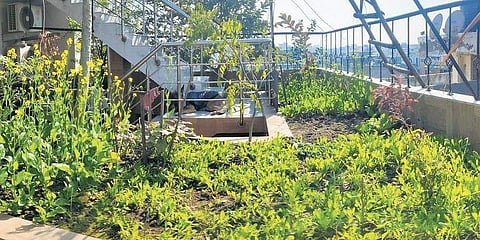
- LIFESTYLE
- FASHION
- FOOD
- ENTERTAINMENT
- EVENTS
- CULTURE
- VIDEOS
- WEB STORIES
- GALLERIES
- GADGETS
- CAR & BIKE
- SOCIETY
- TRAVEL
- NORTH EAST
- INDULGE CONNECT

The view that dominates the skyline in Delhi is of high-rises and towering buildings. As the city transforms into a concrete jungle, many citizens want to seek respite in nature. Instead of looking for alternatives elsewhere, Delhiites are converting corners in their homes into kitchen gardens with much success.
These spaces don’t just serve as a lush garden, but they also help grow plants that produce organic fruits and vegetables. A few Delhi-NCR residents talk to us about transforming their homes into green havens.
A flourishing OASIS
Madhusudan Kukreti and Laxmi Kukreti, residents of West Delhi’s Dwarka Mor, have converted about 50 per cent of their terrace into a kitchen garden. Here they grow vegetables such as aloe vera, lemon, pumpkin, fenugreek, tomato, corn, as well as fruits such as guava, pomegranate, and papaya. This kitchen garden—it was set up in 2018 by the couple—has given them a bountiful supply of homegrown vegetables that have contributed a great deal to their daily meals.
“We use hybrid seeds so the trees that we have grown are not very big but the fruits they bear are large and juicy. For instance, a guava is almost 600g,” shares Amit Bhatt, the couple’s son-in-law. During winters, Madhusudan and Laxmi plant green leafy vegetables such as spinach, bathua (Chenopodium album), sarson (mustard greens). They can grow enough to distribute among their neighbours and relatives as well. “Our neighbours and tenants keep asking us to share some of the vegetables with them (laughs),” concludes Bhatt.
A ‘green’ endeavour
Rama Sitaraman (38), a lawyer residing in Lakshmi Bai Nagar, took to gardening in April 2020. Inspired by videos on YouTube and Instagram, as well as virtual workshops, Sitaraman decided to take her idea forward. “I started composting during the lockdown and I learnt how to grow bio-enzymes in a workshop.
Following that, I started setting up my own kitchen garden, growing vegetables like fenugreek, tomato, and beetroot,” she shares. “Recently, I was making upma and I ran out of dhaniya [coriander], so I picked some from my garden. I have often cooked okra that I grow in my home garden,” she shares.
Along with growing fresh vegetables, she has also been able to make a considerable decrease in the waste produced at home. “I segregate waste produced in my house and use biodegradable waste for composting. It is a learning process; as you learn more, you realise that the waste produced in the kitchen is going back to grow more food,” she concludes.
Homegrown, Tasty and Fresh
Once the pandemic-induced lockdown was announced in March 2020, home chef Sushma Sharma (47) from Gurugram found that she had extra time on her hands. This is when she took up gardening as a hobby.
Over a span of two years, her terrace garden kept growing, yielding a fresh harvest every season. Currently, her terrace hosts several plants such as tomatoes, beans, lemongrass, and eggplant. Sharma keeps alternating between varieties based on seasons—beans, tomato, garlic in winters, and okra and brinjal in summers.
At times, Sharma uses the vegetables she grows at home for the dishes she cooks for her customers. “I recently got an order for sambar. Since only a few brinjals were required, I used the ones that were growing on my terrace. For preparing chutney, I use fresh mint and coriander from my garden,” she shares. Listing the benefits of growing one’s own vegetables, she adds, “The taste [of homegrown vegetables] is different and it is fresher,” she concludes.